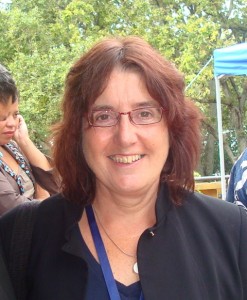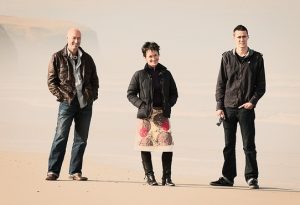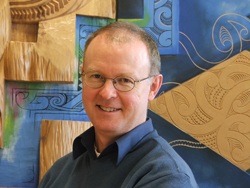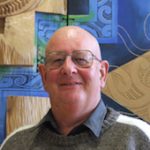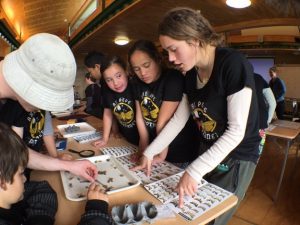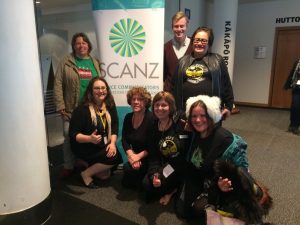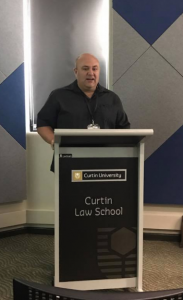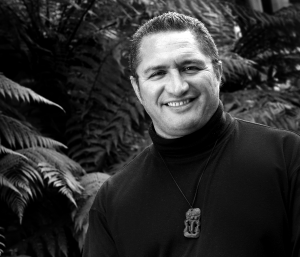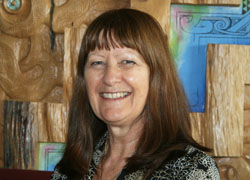Professor Tapsell’s Pūkaki book translated into te reo Māori
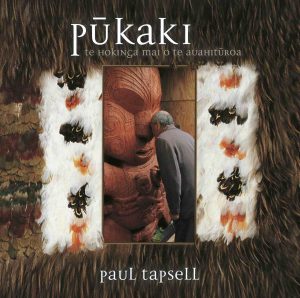 Professor Paul Tapsell‘s 2000 book, Pūkaki: The Return of the Comet is now available in te reo Māori as Pūkaki: Te Hokinga mai o te Auahitūroa. The book was translated by renowned linguist, Scotty Morrison.
Professor Paul Tapsell‘s 2000 book, Pūkaki: The Return of the Comet is now available in te reo Māori as Pūkaki: Te Hokinga mai o te Auahitūroa. The book was translated by renowned linguist, Scotty Morrison.
Kua puta mai he whakamāoritanga o tā Professor Paul Tapsell pukapuka o te tau 2000, ko Pūkaki: Te Hokinga mai o te Auahitūroa te taitara hou. he mea whakamāori e te tohunga rāranga kupu, e Scotty Morrison.
More details of Pūkaki, the book, and the translation process can be found in a recent NZ Herald article.
Kei te wānangahia e te pukapuka nei a Pūkaki, te tipuna o Ngati Whakaue (he hapū nō Te Arawa), me te kōrero mō te whakairo, mō Pūkaki, arā, te take i whakairohia ai, te rironga atu i te Karauana, me te whakahokinga mai ki a Ngāti Whakaue i te tau 1997.
Ka pai, Pāora, kōrua ko Scotty.
Former student wins book award
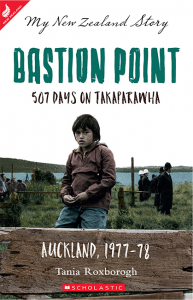 He mihi nunui ki a Tania Roxborogh who recently won the Esther Glenn Award for Junior Fiction in the New Zealand Book Awards. Her book is titled Bastion Point: 507 Days on Takaparawha.
He mihi nunui ki a Tania Roxborogh who recently won the Esther Glenn Award for Junior Fiction in the New Zealand Book Awards. Her book is titled Bastion Point: 507 Days on Takaparawha.
Tania is an alumna of Te Tumu having completed a degree in Māori Studies here in 2015.
In a blogpost she discusses her excitement at winning this award.
Koia, kei a koe, Tania.
The Journeys of Besieged Languages
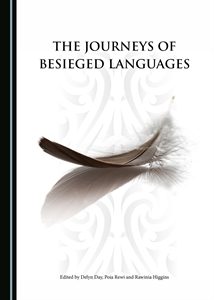 Kāore te kumara e kōrero ana mo tōna ake reka (the kumara never talks of its own sweetness), and Professor Poia Rewi has been humble as usual about his latest publishing success. Arising out of the Te Kura Roa: Minority Language & Dialect Conference held at Otago in 2015, Poia co-edited a new book, The Journeys of Besieged Languages, published by Cambridge Scholars Publishing. His co-editors include Dr Delyn Day, a PhD graduate from te Tumu, and Professor Rāwinia Higgins, a former staff member now at Victoria University of Wellington. Unlike the award-winning, The Value of the Māori Language: Te Hua o Te Reo Māori, (also co-edited by Poia and Rawinia), The Journeys of Besieged Languages focuses on endangered languages from around the world, from New Zealand, the Pacific, Australia, North America, Europe, Greenland, and Israel. Koia kei a koutou, Poia mā.
Kāore te kumara e kōrero ana mo tōna ake reka (the kumara never talks of its own sweetness), and Professor Poia Rewi has been humble as usual about his latest publishing success. Arising out of the Te Kura Roa: Minority Language & Dialect Conference held at Otago in 2015, Poia co-edited a new book, The Journeys of Besieged Languages, published by Cambridge Scholars Publishing. His co-editors include Dr Delyn Day, a PhD graduate from te Tumu, and Professor Rāwinia Higgins, a former staff member now at Victoria University of Wellington. Unlike the award-winning, The Value of the Māori Language: Te Hua o Te Reo Māori, (also co-edited by Poia and Rawinia), The Journeys of Besieged Languages focuses on endangered languages from around the world, from New Zealand, the Pacific, Australia, North America, Europe, Greenland, and Israel. Koia kei a koutou, Poia mā.
Rangahau Roundup
Semester 2 has been busy on the research front for Te Tumu staff and postgrads.
Te Tumu is still progressing with Te Kōparapara, a book on Māori culture, history and contemporary society, which is designed as a textbook for MAOR102 as well as for a general audience. Prof Michael Reilly is the main driver of this project, and has been ably assisted by Dr Gianna Leoni. This book, with an array of essays mainly written by Te Tumu staff, is under contract with Auckland University Press and should appear sometime in 2017.
Faculty News
Associate Prof Jenny Bryant-Tokalau has been having a busy Research and Study Leave. She has given two presentations in the USA in the last semester: ‘Food security and other risks in a time of climate change: traditional and contemporary forms of resilience’, to the Department of Anthropology, and ‘Small Island Pacific States: Dealing with Climate Change’ to the Department of Geology at Wheaton College in Massachusetts. In December she presented ‘Working in Context: The Commercial Potential of Customary Pacific Land’ at the Aotearoa New Zealand International Development Studies Network Ninth Biennial Conference ‘Pacific Currents, Global Tides’ Wellington, and ‘Dealing with disasters and social change’ to the Asia Pacific Biocultural Health ‘Big Ideas’ Workshop, in Dunedin, December.
Jenny has also had one chapter in an edited collection appear during this period: ‘Community responses to floods in Fiji: lessons learned’ In Calabrese, John (ed.) Humanitarian Assistance and Disaster Response: Rising to the Challenge. MAP Series, Middle East Institute, Washington. August (2016) issue. Click here to access it. She also has two book reviews published in New Zealand and Pacific Studies November, 2016; and Journal of the Polynesian Society 125 (1), 2016.
Jenny is planning to return to the Solomon Islands to carry out in-depth interviews on small and medium businesses on Kastom land, as well as to finalise book edits for Palgrave MacMillan Anthropology of Disaster Series: What the Pacific Islands can teach New Zealand about Climate Change.
As previous posted, Prof Paul Tapsell spoke at the Indigenous Plenary at the WAC-8 Conference in September. Paul and Associate Prof Merata Kawharu are also part of the large three-year Mauri-Whenua-Ora project within the National Science Challenge Land and Water: Toitū te Whenua, Toiora te Wai. This project is the only fully Māori-led and Māori-integrated research programmes of all NSCs nationally, and is looking at Maori land and water based innovation including: (1) micro economy development “Pa to Plate”, (2) Shared iwi innovation for Taitokerau as a model for other iwi and (3) a regional (Te Hiku) study looking at Maori land suitable use and value chains. Merata also has a forthcoming publication, “Indigenous Entrepreneurship: Cultural Coding and the Transformation of Ngāti Whātua in New Zealand” in the Journal of the Polynesian Society, 125, 4 (2016): 385-408.
Associate Prof Lachy Paterson gave a presentation entitled ‘U.S. Slave “Humor” in New Zealand Newspapers’ at the 109th Annual Meeting of the Pacific Coast Branch of the American Historical Association at Waikoloa, Hawai’i. He is currently writing up this paper, which looked at how imported racist discourses permeated New Zealand’s English-language newspapers. Lachy returned to his ongoing obsession with Māori-language newspapers, with “The New Zealand Government’s Niupepa and their Demise” published in the New Zealand Journal of History, 50, 2 (2016): 44-67.
Together with Associate Prof Angela Wanhalla (Dept of History and Art History), he has also sent off their manuscript “He Reo Wahine: Māori Women’s Voices from the Nineteenth Century” to Auckland University Press, and it should appear sometime in 2017.
Over summer Prof Michael Reilly hopes to write a paper concerning the research relationship between William Wyatt Gill of the London Missionary Society, and Mamae of Ngāti Vara, a church minister, on Mangaia during the 19th century. In the longer run, he wants to begin writing chapters for an introduction to Māori tribal history, drawing from the draft text used as a ‘course reader’ in MAOR 207 Ngā Kōrero Nehe – Tribal Histories. Michael is passionate about this project but acknowledges that it may take several years to finish. He has also completed the final editorial corrections for a paper to be published this December, “Narrative Features and Cultural Motifs in a Cautionary Tradition from Mangaia (Cook Islands)”, in the Journal of the Polynesian Society 125, 4 (2016): 357-384.
Dr Jim Williams has a forthcoming article in the Journal of the Polynesian Society, entitled “Seafood Gardens”. Jim has a busy summer planned, fininishing off an essay for Ethnohistory, entitled “Layers of History” explaining how certain activities are repeated at powerful places, giving rise to notions of circularity of time, but layered, like whakapapa; he will also be giving a presentation in January at the American Historical Association conference in Denver. One of Jim’s students, Katrina Bryant, has just completed her Master of Physiotherapy.
In October newly graduated Dr Gianna Leoni gained a new position based in Te Tumu, that of a Ngā Pae o te Māramatanga postdoctoral fellow, with the research project “Te Ōhanga o te Pīpīwharauroa – Expressing our Economic Aspirations”. Click here for more details.
 In June, Megan Pōtiki presented on her doctoral research on language loss at Ōtākou, at He Rau Tumu Kōrero IX at Te Rau Aroha Marae in Bluff. This event was run by Te Pouhere Kōrero, the national Māori historians organisation. Megan has also published two journal articles, “The Otago Peninsula: A unique identity” in Shima, 10, 1 (2016): 67-84 [Potiki-Shima-v10n1-3]; and ‘Te Haka Nā Ngā Herehere’ in Te Pouhere Kōrero 8 (2016): 6 –25, and is currently working on another article, “Māori song composition and reclamation of traditional tribal borders” based on a mōteatea she composed for the Te Tumu Kapa Haka group.
In June, Megan Pōtiki presented on her doctoral research on language loss at Ōtākou, at He Rau Tumu Kōrero IX at Te Rau Aroha Marae in Bluff. This event was run by Te Pouhere Kōrero, the national Māori historians organisation. Megan has also published two journal articles, “The Otago Peninsula: A unique identity” in Shima, 10, 1 (2016): 67-84 [Potiki-Shima-v10n1-3]; and ‘Te Haka Nā Ngā Herehere’ in Te Pouhere Kōrero 8 (2016): 6 –25, and is currently working on another article, “Māori song composition and reclamation of traditional tribal borders” based on a mōteatea she composed for the Te Tumu Kapa Haka group.
As part of Māori language week this year Tangiwai Rewi was asked to give a Library research floor talk on Wednesday 13 July on the Ngāruawāhia Turangawaewae regatta, which comes out of her doctoral research and an article last year in the Journal of the Polynesian Society. A display themed around the article was shown in the Hocken Collections for seven weeks as part of Māori language Week. Click here for more details and pictures.
Tangiwai has participated in the Ahi Pepe Resource launch 27 October and Wānanga 26-28 October. She was a collaborator in this project which created an immersion te reo Māori Moths resource depicting the 600+ species endemic to the South Island. Twelve schools were invited to the Wānanga, to participate, learn how to trap, kill and present moths for identification and preservation. Also launched that night were the bilingual and total immersion resource covering the four areas of the South Island.
Tangiwai also attended the SCANZ (Science Communicators Association NZ) conference on 14 November as part of the panel who discussed the resource and preservation of moths.
Tangiwai went north to attend the Te Awamārahi poukai on 24 November. (Poukai are ceremonial gatherings held on Kīngitanga marae.) This was an opportunity to take the photo display back to her marae especially as some of people featured in the photos come from that marae. The photo boards were put on display along with other harakeke resources found along the riverbanks. Needless to say, Tangiwai also vigorously promoted Te Tumu and the University of Otago to all the people who came to view the display.
Postgraduate News
Congratulations to Matangi Schaaf who graduates in December with a PhD; and also to Nikki Walden (Taranaki, Te Āti Awa) and Nurul Sultan with Master of Indigenous Studies degrees. Click here for more details.
Two of our PhD students are submitting in December: John Birnie and Taomi Qiliho-Tapu, and Tāwini White (Ngāi Tahu, Te Rarawa) is making the final amendments to her MA thesis. Rieko Hayakawa‘s PhD thesis ‘Possibility of Telecommunication Universal Service in the Pacific Islands; Case studies of Vanuatu, PEACESAT and USPNet’ has just passed examination. We look forward to these students graduating in the near future.
We have a new PhD student who has just started, Raaniera Te Whata (Ngāpuhi, Ngāti Porou, te Whānau a Apanui), researching communities-based Māori land development in the Bay of Islands. Raaniera comes into doctoral studies after completing an LLB in Auckland and a Master of Indigenous Studies in Te Tumu.
In August Erica Newman who is undertaking PhD research on Fijian Orphanages (1874-1970) presented at the Anthropology and Archaeology Postgraduate Symposium held here in Dunedin.
Matiu Payne (Ngāi Tahu, Ngāti Mutunga), who is researching the impact of government agencies on tikanga whāngai for his doctoral studies, has just been to the Australia New Zealand Law and History Society conference at Curtin University in Perth presenting on his PhD research.
Kelli Te Maihāroa (Waitaha) who is researching Māori peace traditions and their relevance to whānau today, has co-edited an edited collection: H. Devere, K. Te Maihāroa, & J.P. Synott (eds.) Peacebuilding and the Rights of Indigenous Peoples: Experiences and Strategies for the 21st Century, (Springer: Cham, Switzerland, 2016), which includes two co-written and one sole-authored articles by Kelli. She also has an article forthcoming, “Whanaungatanga: Relationships in a One Day Te Reo Māori School of Excellence” in Theobald, M. (Ed.) Friendships in Multilingual Settings (Sociological Studies of Children and Youth, Vol 21 (2016)). Emerald. Kelli, who is a lecturer in the College of Education, also presented at the Teacher Education Forum of Aotearoa New Zealand, in June/July in Dunedin, and at International Indigenous Research Conference in November in Auckland.
The Otago Peninsula: A Unique Identity
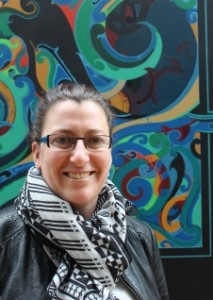 It’s wonderful to see Te Tumu’s emerging scholars getting their research out to the world. Megan Pōtiki, one of our teaching staff and also undertaking doctoral studies, has just published an article on the Otago Peninsula in Shima: The International Journal of Research on Island Cultures. The full text of the article can be accessed here.
It’s wonderful to see Te Tumu’s emerging scholars getting their research out to the world. Megan Pōtiki, one of our teaching staff and also undertaking doctoral studies, has just published an article on the Otago Peninsula in Shima: The International Journal of Research on Island Cultures. The full text of the article can be accessed here.
Ka taea te kī mō tēnei tuhinga, “Mō tātou, ā, mō kā uri, ā, muri ake nei”.
The Otago Peninsula: A Unique Identity
ABSTRACT: The Otago Peninsula on the South Island of New Zealand has a long indigenous Māori history that is rooted in the land and the people of the area. The stories and genealogy that connect Māori New Zealanders to the Otago Peninsula are well documented and retold. After European contact with and connection to the Peninsula was initiated the colonisation of the area occurred rapidly. The Otago Peninsula historically, and to the present day, has always had a separate chartacter to that of the adjascent mainland (around the city of Dunedin). Despite the short distance between them, the culture of the Otago Peninsula remains distinct to that of the mainland as if it were an island.
Michael Reilly – selected for the JPH Virtual Special Issue
The Journal of Pacific History has reached its 50th year, and the editors have produced a “Virtual Special Issue” to commemorate this milestone with 26 previously published essays. Authors include the likes of Marshall Sahlins, Greg Dening, Neil Gunson, Judith Binney and others. Included among the luminaries is Te Tumu’s Professor Michael Reilly, with his essay, ‘Grief, Loss and Violence in Ancient Mangaia, Aotearoa and Te Waipounamu’, which appeared in Vol. 47 (2012). As the editors state, this ‘is a brilliant analysis of the language of emotion in vernacular texts by a prolific contributor to JPH.’ Congratulations, Michael, for this recognition of your great contribution to Pacific history.
Success at the Ngā Kupu Ora Book Awards
I te Rāmere nei i tū ai Ngā Kupu Ora Book Awards, ā kei Te Hua o Te Reo Māori te wini mō te paraihe Reo. He mea ētita tēnei pukapuka e Ahorangi Rāwinia Higgins (he kaiako ia nō Te Tumu i ngā rā o mua) rātou ko Ahorangi Tuarua Poia Rewi (koia te Tīni o Te Tumu ināianei) ko Vincent Olsen-Reeder.
The Ngā Kupu Ora Book Awards were held on Friday. The Value of the Māori Language: Te Hua o Te Reo Māori, co-edited by former Te Tumu staff member Associate Professor Rāwinia Higgins, current Te Tumu Dean Associate Professor Poia Rewi, and Vincent Olsen-Reeder, took out the Te Reo prize.
He pukapuka tēnei “that aims to engage and reawaken Māori consciousness on the value of Māori language won the Te Reo prize. The Value of the Māori Language: Te Hua o Te Reo Māori draws on research from more than 30 contributors about the value of the Māori language and their aspirations for its future direction.” Click here for more details of the awards.
He mihi nunui ki ngā ētita, ki ngā kaituhi hoki o ngā pukapuka i toa, ā, ki ngā pukapuka katoa e whakatairanga ana i te kaupapa o te mātauranga Māori.
Te Tumu and the Ngā Kupu Ora Aotearoa Māori Book Awards
Two publications involving Te Tumu staff feature in the “Te Reo Māori” section of this year’s Ngā Kupu Ora Aotearoa Māori Book Awards, an annual event that has been honouring excellence in Māori writing since 2009. The 2015 event will be held on Thursday evening, 10 September at Te Marae, Te Papa Tongarewa in Wellington, with 15 finalists competing in 6 categories.
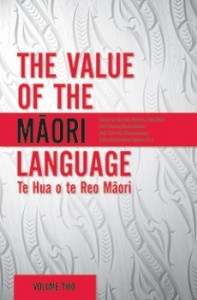
Rawinia Higgins, Poia Rewi and Vincent Olsen-Reeder, The value of the Māori Language: Te Hua o te Reo Māori (Wellington: Huia, 2014). Associate Professor Poia Rewi is currently the Dean of Te Tumu and Professor Rawinia Higgins, a former Te Tumu staff member (now the Head of Te Kawa a Māui, Victoria University), co-edited this volume and co-wrote a chapter on their ZePA model for language revitalization. Also featured are chapters from former Te Tumu staff member, Hana O’Regan, and Katharina Ruckstuhl, a former Te Tumu student and Senior Research Analyst at the Research and Enterprise Office of the University of Otago.
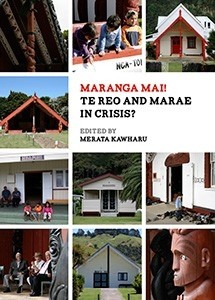 Merata Kawharu, Maranga mai! Te Reo and marae in crisis? (Auckland: Auckland University Press, 2014). Associate Professor Merata Kawharu, an adjunct member of Te Tumu, edited this collection from a number of eminent scholars on the state of te reo Māori and the participation of Māori in marae activities.
Merata Kawharu, Maranga mai! Te Reo and marae in crisis? (Auckland: Auckland University Press, 2014). Associate Professor Merata Kawharu, an adjunct member of Te Tumu, edited this collection from a number of eminent scholars on the state of te reo Māori and the participation of Māori in marae activities.
We wish both Merata and Poia the best of luck in these Awards.
Journal News
Dr Lyn Carter is a Senior Lecturer in Te Tumu, and the Coordinator of our Indigenous Development programme.
Marginalisation occurs when a group of people are pushed to the periphery of a society. Many Māori reside at the margins of ‘mainstream’ society, while others are at the margins of Māori society. The present paper explores how ‘by Māori, for Māori’ research and evaluation can create spaces for voices from the margins to be heard. The paper arose out of a series of hui in which papers on the notion of marginalisation and Māori were presented and discussed, along with the broader topic of research ethics and protocols. Three themes that emerged from these hui are considered in this paper: relationships between researchers and participants/communities, researchers knowing themselves, and the safety aspects inherent within tikanga. The discussion of these themes draws upon the papers that were written for this project, the feedback from hui participants (researchers, students, health professionals, government workers, community providers), and local and international literature on research ‘by and with’ indigenous peoples. In making the ‘knowing’ we hold about these issues more explicit, this paper aims to generate more discussion as well as provide some small guidance for those who may be new to this thing called ‘research’.
The Journal of the Polynesian Society has been going for a little longer…
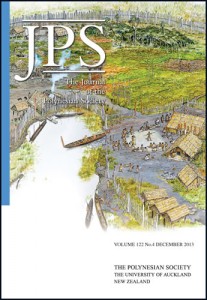 9 Reasons to Publish in the Journal of the Polynesian Society
9 Reasons to Publish in the Journal of the Polynesian Society
- For nearly 125 years, an international forum for the dissemination and discussion of cross-disciplinary research of and by Pacific peoples (broadly defined), past, traditional, and contemporary.
- Submissions welcomed from anthropology, linguistics, history, politics, sociology, visual arts and material culture studies, archaeology, biological anthropology, indigenous studies, and cultural geography
- Issues published quarterly, peer-reviewed; full length research articles (up to 15,000 words) and shorter communications
- Member of CrossRef index service, articles DOI-supported, Journal of Citation Reports rated
- Rapid submission-to-print turn-around time
- Guest-edited Special Issues welcomed & available for one-off purchase
Links:
Dr Karyn Paringatai’s success celebrated.
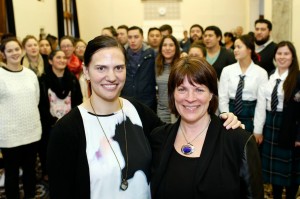
Te Tumu lecturer, Dr Karyn Paringatai and Professor Harlene Haynes, Vice Chancellor of the University of Otago.
On Monday night, the Vice-Chancellor celebrated Te Tumu staff member, Dr Karyn Paringatai’s success, with an event attended by many people from within the university, including Te Tumu staff and students. See the Otago Bulletin story here.
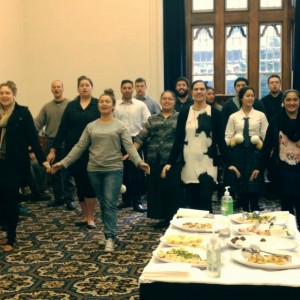
Indigenising the Academy – performing Ngoi Pewhairangi’s “Whakarongo” in the University of Otago’s Council Chambers to celebrate the success of Dr Karyn Paringatai.
Karyn won New Zealand’s top tertiary teaching award recently in Wellington, the Prime Minister’s Supreme Award for Tertiary Teaching Excellence, based on utilising the pre-contact Māori pedagogy of teaching in complete darkness, which has proved to be outstandingly successful in her performing arts paper, MAOR108 Waiata: Te Tīmatanga. Listen to the Radio NZ interview and Dunedin Television item in which Karyn explains her teaching practice.
Karyn has undertaken significant research to ensure that her teaching in the dark, and has just published on this ‘A Return to the “Dark Ages”’ in the journal Akoranga 10 (2014).
Just this week Karyn also employed the same methods in a guest lecture for the 900 students of MAOR102: Māori Society, showing that this pedagogy can be applied to more than just performing arts. She is planning to continue to use and develop “teaching in the dark” and publish more on this research.

